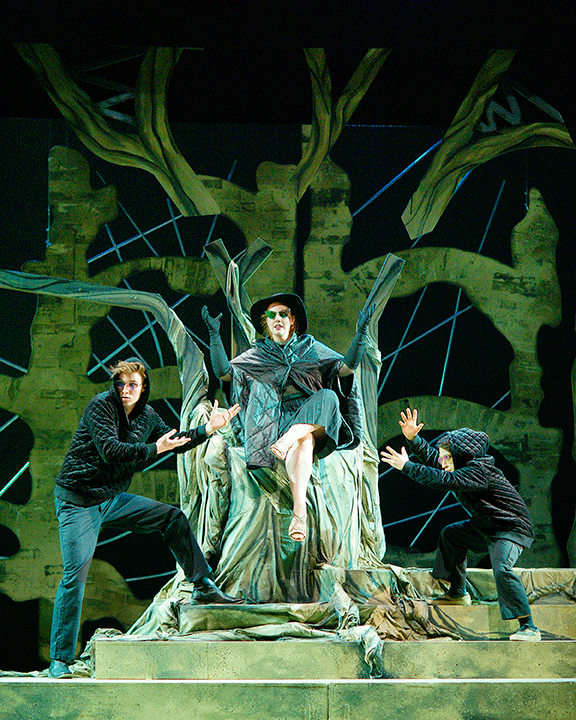Titus Andronicus at Hart House Theatre
Korto Zambeli-Tardif STAFF WRITER
Photo: Scott Gorman / HART HOUSE.
Many hold it evident that William Shakespeare stands head and shoulders above all other playwrights. To audience members, it is understood that the interpretations made by contemporary theatre companies must serve to keep the bard’s texts intelligible in today’s very different linguistic and cultural contexts. Some plays lend themselves better to this sort of remaking than others. Titus Andronicus, the fourth and final show of Hart House’s regular 2017–18 season, is certainly one of the more resistant works, but Director James Wallis’ production responds effectively by leaning into the melodrama of Shakespeare’s early experiment in baroque tragedy.
Titus Andronicus begins with the titular Roman general Titus Andronicus (David Mackett) returning to Rome from a campaign against the Goths, with the corpses of his sons and several important captives in tow. He is soon embroiled in two conflicts: first, there are the competing campaigns of the late emperor’s children to succeed the throne, in which Andronicus sways the people in favour of Saturninus (Tristan Claxton); second, there is the cycle of revenge kicked off when Andronicus and his remaining children ritually sacrifice half the offspring of Tamora, the enslaved Queen of the Goths (Shalyn McFaul). These two clashes become hopelessly intertwined when Tamora is chosen by Saturninus as his bride, allowing her the opportunity to destroy Andronicus for his refusal of mercy to her kin. When you add the satanic machinations of Tamora’s lover Aaron (Shawn Lall) and the violent desire conceived by multiple characters for Titus’ daughter Lavinia (Bailey Green), the complexity of the piece becomes clear.
On one hand, Titus Andronicus is confrontational, largely due to its violence. On the other hand, it is manifestly ridiculous. By carefully leaning into that quality, Wallis’ production derives strength from a weak script. Mackett’s performance is serviceable for the first half of the play, but as Titus Andronicus loses children and limbs, the character’s shockingly dark sense of humour emerges in a great dramatic turn. Watching Mackett on stage, it is suddenly clear that Andronicus’ great strength as a Shakespearean protagonist is in the transformation from a humourless agent of the state to an outsider who has unique insight into the folly on which Rome is built. He walks among tree trunks suggestive of his own grasping hands, a backdrop which fails to conceal a disorderly lattice of sharp steel pikes, ready to tear into flesh. Holly Meyer-Dymny deserves recognition for the most thematically appropriate application of set design I have seen over two seasons of Hart House shows.
The clown (Laura Darby) is an incarnation of the thin line between tragedy and comedy on which the play strides. She skips around the stage, using circus props to mimic the violent acts the characters perform on one another. This brilliant tactic reinforces the fragility of human bodies constantly menaced with pulverization, but it also establishes a Lynchian framework with which to view the play’s events. The clown reveals the inherent thoughtlessness of the escalating carnage, making space for the cast to flesh out this cartoonish vision of imperial Rome’s slow decline without alienating the audience.
Several female actors become male characters in this production; of these, Annie MacKay is most notable as Marcus Andronicus. Her toned-down performance contains its own counterpoint when she almost shatters at the sight of Lavinia’s mutilation. On the other end of the spectrum, Lall and Claxton both appropriately dial up their characters as, respectively, an exponent of pure evil and a hectoring man-child. To complete this scene-stealing ensemble, McFaul delights the audience in her role as the fabulous and vengeful Empress of Rome. It is a shame that the play’s final scene is so blunt and chaotic that McFaul has no opportunity for an impressive exit, but even this unsatisfying ending is almost rescued by the determined efforts of Dylan Evans as Lucius to land a meaningful, emotional note for the denouement.
Despite the severe presentation of Titus Andronicus, I enjoyed it for its self-indulgence and unpolished nature. There are some real gems in its dialogue, and the endless plot twists are unpredictable and engaging. Willis’ direction brings the play to life with a confidence that it does not possess on the page. We don’t know much of what appealed to Shakespeare’s audience, but judging by the delighted shock of my fellow audience members at intermission and curtain call, even the bard’s most gory and disjointed effort can still thrill a crowd.
Titus Andronicus played at Hart House Theatre from March 2 to 10, closing their season.




